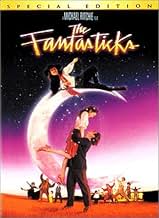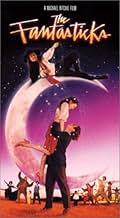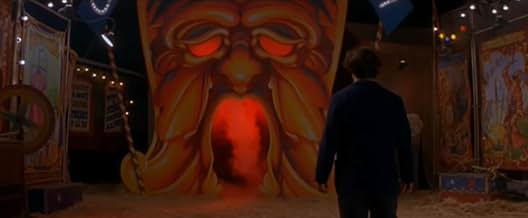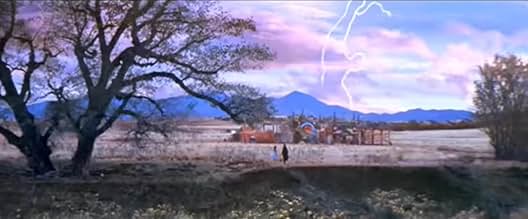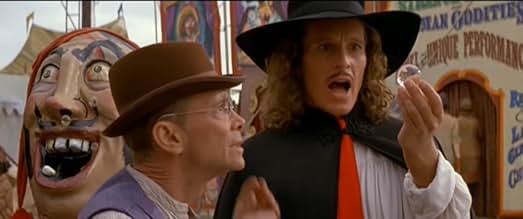VALUTAZIONE IMDb
5,7/10
1463
LA TUA VALUTAZIONE
Aggiungi una trama nella tua linguaA mysterious fair that comes to a small community in the countryside could make real the illusions of two teenagers.A mysterious fair that comes to a small community in the countryside could make real the illusions of two teenagers.A mysterious fair that comes to a small community in the countryside could make real the illusions of two teenagers.
- Regia
- Sceneggiatura
- Star
Joey McIntyre
- Matt
- (as Joe McIntyre)
Tony Cox
- His Assistant
- (as Joe Anthony Cox)
Recensioni in evidenza
I am a big musical fan. As a high school choir teacher, I require my students to watch them. I won't be requiring them to watch this.
Another comment on this forum said that the negatively opinionated people should cut the movie version some slack as there are always differences with a screenplay. True, but most of the screenplay versions have become classics in their own right--and for good reason. That reason being that the screenplay itself is an excellent adaptation and it is quality work. Not so with this disappointing movie.
This movie had great potential with a good cast. I think that Jean Louisa Kelly was the bright spot, quite good actually, and the actor who portrayed El Gallo was the low spot.
Ironically, the movie was like the story. Once Matt and Louisa had the freedom to see each other and empowered to make their relationship and fantasies materialize from abstract to concrete, the magic was gone. I felt the magic of the play was gone because much of what was the magic of our imagination and imagery gave way to too many concrete images on screen via sets, props, and what not. It simply didn't work.
I remember the intimacy of doing this play in high school. I was not on stage, but I was one of the "pit" musicians. We did it in 3/4 in the round. The theater seated 70 people. The cast interacted with the pit and the audience. It was simply charming. It was magical. Not so with this movie.
Like others, big question marks entered my head with the script. I kept saying to myself several times during the viewing, "I don't remember this," or "I thought something else happened (or was said)."
No, I'm not going to cut this some slack just because a movie version is going to differ from the staged version. We own most of the movie versions of various musicals and we watch them and re-watch them and re-watch them again and again. Why? Because they're great. This one?....Well, I'm glad we rented it.
Go see the real thing. On a stage.
Another comment on this forum said that the negatively opinionated people should cut the movie version some slack as there are always differences with a screenplay. True, but most of the screenplay versions have become classics in their own right--and for good reason. That reason being that the screenplay itself is an excellent adaptation and it is quality work. Not so with this disappointing movie.
This movie had great potential with a good cast. I think that Jean Louisa Kelly was the bright spot, quite good actually, and the actor who portrayed El Gallo was the low spot.
Ironically, the movie was like the story. Once Matt and Louisa had the freedom to see each other and empowered to make their relationship and fantasies materialize from abstract to concrete, the magic was gone. I felt the magic of the play was gone because much of what was the magic of our imagination and imagery gave way to too many concrete images on screen via sets, props, and what not. It simply didn't work.
I remember the intimacy of doing this play in high school. I was not on stage, but I was one of the "pit" musicians. We did it in 3/4 in the round. The theater seated 70 people. The cast interacted with the pit and the audience. It was simply charming. It was magical. Not so with this movie.
Like others, big question marks entered my head with the script. I kept saying to myself several times during the viewing, "I don't remember this," or "I thought something else happened (or was said)."
No, I'm not going to cut this some slack just because a movie version is going to differ from the staged version. We own most of the movie versions of various musicals and we watch them and re-watch them and re-watch them again and again. Why? Because they're great. This one?....Well, I'm glad we rented it.
Go see the real thing. On a stage.
Given the resources and talent involved, one would have hoped for much more, but the movie lacks the sparkle of even a mediocre stage production.
Joel Grey as Bellamy phoned in his performance. Even making allowances for the fact that he was 63 when he made the movie, his performance was remarkably lifeless and his singing was unremarkable, even strained at times. Brad Sullivan as Hucklebee was even worse, flat performing and flat singing. Joseph McIntyre as The Boy turned in a passable performance, though he didn't really do the role justice. Jean Louisa Kelley as The Girl was perhaps the brightest spot in the lineup, delivering an adequate if not inspired performance.
Jonathon Morris was sadly miscast as El Gallo. He had the agility and strength needed for such a physical role, but lacked the proper menacing look needed. His acting was, if not totally flat, at least rather plastic. And the one song he needed to really carry -- "Try to Remember" -- he didn't have the voice for.
The staging was the most inspired part of the movie. Simply filming the minimalistic stage production wouldn't have worked, but the movie's set -- two homes and a carnival set in the prairie -- was sufficiently minimalistic to honor the play's concept while still bending to the requirements of the big screen. This facilitated devices that helped to flesh out some of the more ambiguous scenes in the play.
The script was unfortunately a Bowdlerized version. The song substituted for "The Rape Ballet" was incredibly uninspired and inconsistent. It was almost as if the writer wanted the substitute to be bad, in retaliation for pulling the original piece. In addition to "The Rape Ballet" substitution, several other songs were changed from the original, generally not for the better, and the delightful "Plant a Radish" was omitted entirely.
Perhaps the saddest change of all from the stage play was that the role of The Narrator was essentially omitted, and with it some of the most enchanting poetry in the script.
Joel Grey as Bellamy phoned in his performance. Even making allowances for the fact that he was 63 when he made the movie, his performance was remarkably lifeless and his singing was unremarkable, even strained at times. Brad Sullivan as Hucklebee was even worse, flat performing and flat singing. Joseph McIntyre as The Boy turned in a passable performance, though he didn't really do the role justice. Jean Louisa Kelley as The Girl was perhaps the brightest spot in the lineup, delivering an adequate if not inspired performance.
Jonathon Morris was sadly miscast as El Gallo. He had the agility and strength needed for such a physical role, but lacked the proper menacing look needed. His acting was, if not totally flat, at least rather plastic. And the one song he needed to really carry -- "Try to Remember" -- he didn't have the voice for.
The staging was the most inspired part of the movie. Simply filming the minimalistic stage production wouldn't have worked, but the movie's set -- two homes and a carnival set in the prairie -- was sufficiently minimalistic to honor the play's concept while still bending to the requirements of the big screen. This facilitated devices that helped to flesh out some of the more ambiguous scenes in the play.
The script was unfortunately a Bowdlerized version. The song substituted for "The Rape Ballet" was incredibly uninspired and inconsistent. It was almost as if the writer wanted the substitute to be bad, in retaliation for pulling the original piece. In addition to "The Rape Ballet" substitution, several other songs were changed from the original, generally not for the better, and the delightful "Plant a Radish" was omitted entirely.
Perhaps the saddest change of all from the stage play was that the role of The Narrator was essentially omitted, and with it some of the most enchanting poetry in the script.
The pluses for this are terrific art and production design which is beautifully displayed by the cinematography of Fred Murphy but pretty pictures only go so far. The piece's other strong suit is a fine score with many lovely songs however they are compromised by being given to the two leads who have thin reedy voices without distinction or subtlety and the tunes suffer because of it. The score was a favorite of the young Barbra Streisand and she recorded several of the numbers, listen to her versions of Much More, Soon It's Gonna Rain and particularly I Can See It and you'll understand what has been lost in the pallid interpretations offered here. Alas it is of no help that the same romantic leads share zero chemistry on screen with McIntyre practically disappearing from the screen, so bland is his presence. The best work is turned in by Brad Sullivan and Joel Grey but their parts are small and Grey is especially wasted. Catch the live show instead.
Ok, maybe it can be argued that it is simply not possible to make a decent film of this wonderful musical. But even given that, one certainly could have done a better job than this. I rate this at the bottom of the pile of stage to screen transfers along with the dreadful Bye, Bye, Birdie and Paint Your Wagon.
First, why cut "Try to Remember" (the one song that practically everyone knows) from the beginning of the picture (and trim it at the end). It establishes the whole mood of the show - calling the audience to remember back when they first fell in love and the magic of that moment. This show just opens with Bellamy sewing (?)
Then, because they wanted to make it more like a traditional movie musical, they cut the narrator - and with him went most of the wonderful dialogue much of it spoken in poetry and verse (note the absence of the speech before "Soon Its Gonna Rain"["You wonder how these things begin...]; trimmed down is the "Curious Paradox" speech the most important part being cut out; gone is Louisa's self-description that sets up "Much More" as well as Matt's intro to "Metaphor"; and most important of all the speech opening the second act is gone which explains much of what the story is about).
Gone also are all the wonderful metaphors (the whole idea behind the song of the same title)that prevade the show - the gardening metaphors are gone (hence why "Plant a Radish" was cut, though one wonders why they left in "This Plum is Too Ripe"); gone also is the metaphor of the wall (one of the most important in the show, leading to the most significant, if not most enigmatic, line in the play "Leave the wall, you must always leave the wall.")
Not surprisingly the mute is cut, but other characters are changed as well. With the narrator gone, the motive of El Gallo is unclear. Why is he doing these things? Why does he say the curious paradox speech if he is not going to explain why he hurt them (and himself)? Only the part of Henry remains fairly faithful to the original play (even Mortimer is given over to Teller as a non-speaking role). Louisa is played too simperingly sweet rather than as a self-absorbed teenage girl fascinated more with the idea of being in love than actually loving Matt. Her transition at the end (from "I am love" originally in Metaphor to "You are love" at the reprise) makes no sense in this version.
Yes, most of the songs are there. But they are often trimmed down, replaced with safer songs (like the absolutely horrible "Abductions" replacing the clever "It Depends on What you Pay) or the lyrics are completely rewritten("Metaphor"). I know the arguments for replacing "Depends", but I have directed the show twice and played El Gallo once and have not ever heard a complaint about the song - you simply have to introduce it correctly.
One wonders why they even decided to film this show if they were going to change it so much. I believe a fairly decent film might have been made if they had stayed with what they had. Instead they decided to go Hollywood with it and the result is nothing like the original story. No wonder it stayed in the can for 6 years before being released. It probably should have stayed there. One big disappointment.
First, why cut "Try to Remember" (the one song that practically everyone knows) from the beginning of the picture (and trim it at the end). It establishes the whole mood of the show - calling the audience to remember back when they first fell in love and the magic of that moment. This show just opens with Bellamy sewing (?)
Then, because they wanted to make it more like a traditional movie musical, they cut the narrator - and with him went most of the wonderful dialogue much of it spoken in poetry and verse (note the absence of the speech before "Soon Its Gonna Rain"["You wonder how these things begin...]; trimmed down is the "Curious Paradox" speech the most important part being cut out; gone is Louisa's self-description that sets up "Much More" as well as Matt's intro to "Metaphor"; and most important of all the speech opening the second act is gone which explains much of what the story is about).
Gone also are all the wonderful metaphors (the whole idea behind the song of the same title)that prevade the show - the gardening metaphors are gone (hence why "Plant a Radish" was cut, though one wonders why they left in "This Plum is Too Ripe"); gone also is the metaphor of the wall (one of the most important in the show, leading to the most significant, if not most enigmatic, line in the play "Leave the wall, you must always leave the wall.")
Not surprisingly the mute is cut, but other characters are changed as well. With the narrator gone, the motive of El Gallo is unclear. Why is he doing these things? Why does he say the curious paradox speech if he is not going to explain why he hurt them (and himself)? Only the part of Henry remains fairly faithful to the original play (even Mortimer is given over to Teller as a non-speaking role). Louisa is played too simperingly sweet rather than as a self-absorbed teenage girl fascinated more with the idea of being in love than actually loving Matt. Her transition at the end (from "I am love" originally in Metaphor to "You are love" at the reprise) makes no sense in this version.
Yes, most of the songs are there. But they are often trimmed down, replaced with safer songs (like the absolutely horrible "Abductions" replacing the clever "It Depends on What you Pay) or the lyrics are completely rewritten("Metaphor"). I know the arguments for replacing "Depends", but I have directed the show twice and played El Gallo once and have not ever heard a complaint about the song - you simply have to introduce it correctly.
One wonders why they even decided to film this show if they were going to change it so much. I believe a fairly decent film might have been made if they had stayed with what they had. Instead they decided to go Hollywood with it and the result is nothing like the original story. No wonder it stayed in the can for 6 years before being released. It probably should have stayed there. One big disappointment.
"The Fantasticks" has been a part of my life since 1960 when I first saw Kenneth Nelson, Rita Gardner, and Jerry Orbach play in the original. Over the past forty years I've directed, played-in, or played-for hundreds of performances from New York to Miami. I feel I know the play inside and out, even adding many touches for the mute that was never off-Broadway. Thirty some-odd years ago, I saw it on television, as I recall, it was John Davison, Lesley Ann Warren, and Ricardo Montalban (as El Gallo). I, being a purist, thought the TV show was abominable. But I was younger and hadn't learned to tolerate or respect other viewpoints or interpretations. I held my breath as I started playing the DVD after finding out that the opening "Try to Remember" was gone....but the more I watched...Jonathan (Stephen Sondheim's musicals) Tunnick's orchestrations started working a magic on me, and by the time "Soon It's Gonna Rain". finished, I was charmed and captivated. I didn't object to the new "Depends on What You Play", for the melody as always been in the score, only played by the "orchestra" as the Rape music ballet. Reading the other posts on IMDB board, I think many comments were unfair to this movie. There is NO way you could capture the original staging on film. A compromise had to be reached. And since it was Jones and Schmidt who wrote the screenplay, they and they alone had to right to do with it as they wished.
Lo sapevi?
- QuizThe movie was filmed in 1995, and shelved for five years. The released version was re-edited by Francis Ford Coppola with the consent of director Michael Ritchie.
- Versioni alternativeThe DVD includes 3 deleted songs
- Plant a Radish, Get a Radish.
- It Depends on What You Pay.
- Try to Remember
- Colonne sonoreOverture
Music by Harvey Schmidt
I più visti
Accedi per valutare e creare un elenco di titoli salvati per ottenere consigli personalizzati
Dettagli
- Data di uscita
- Paese di origine
- Lingua
- Celebre anche come
- Фантастики
- Luoghi delle riprese
- Aziende produttrici
- Vedi altri crediti dell’azienda su IMDbPro
Botteghino
- Budget
- 10.000.000 USD (previsto)
- Lordo Stati Uniti e Canada
- 49.666 USD
- Fine settimana di apertura Stati Uniti e Canada
- 24.176 USD
- 24 set 2000
- Lordo in tutto il mondo
- 49.666 USD
Contribuisci a questa pagina
Suggerisci una modifica o aggiungi i contenuti mancanti


